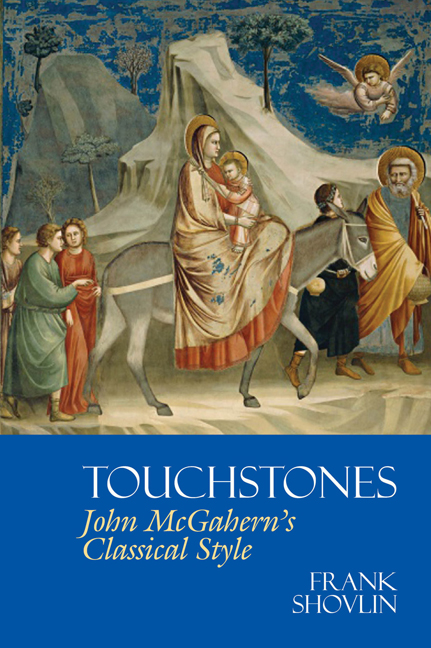Book contents
- Frontmatter
- Dedication
- Epigraph
- Contents
- Acknowledgements
- Touching Stones: Matthew Arnold and the Canon
- 1 We Other Clerks: James Joyce and the Classical Temper
- 2 A Walking Mirror: Stendhal, Horace, Nietzsche
- 3 One Lone Paperback: Tolstoy and Religious Sensibility
- 4 Magic: The Centrality of W. B. Yeats
- 5 Instinct: Douglas Stewart and Sex
- 6 The Fume of Muscatel: Yeats's Ghosts
- 7 Bohemian Rhapsody: Patrick Kavanagh and Generation X
- 8 Absurdity: Camus Comes to Clones
- 9 Aristocracy: Andrew Marvell, W. B. Yeats and the Curse of Cromwell
- 10 The Consolations of Nothingness: William Blake, W. B. Yeats and Prayer
- 11 Deliberate Happiness: W. B. Yeats and the Inner Life
- 12 Stranger in Paradise: Dante and Epic Style
- Conclusion: What Then?
- Bibliography
- Index
6 - The Fume of Muscatel: Yeats's Ghosts
from Touching Stones: Matthew Arnold and the Canon
- Frontmatter
- Dedication
- Epigraph
- Contents
- Acknowledgements
- Touching Stones: Matthew Arnold and the Canon
- 1 We Other Clerks: James Joyce and the Classical Temper
- 2 A Walking Mirror: Stendhal, Horace, Nietzsche
- 3 One Lone Paperback: Tolstoy and Religious Sensibility
- 4 Magic: The Centrality of W. B. Yeats
- 5 Instinct: Douglas Stewart and Sex
- 6 The Fume of Muscatel: Yeats's Ghosts
- 7 Bohemian Rhapsody: Patrick Kavanagh and Generation X
- 8 Absurdity: Camus Comes to Clones
- 9 Aristocracy: Andrew Marvell, W. B. Yeats and the Curse of Cromwell
- 10 The Consolations of Nothingness: William Blake, W. B. Yeats and Prayer
- 11 Deliberate Happiness: W. B. Yeats and the Inner Life
- 12 Stranger in Paradise: Dante and Epic Style
- Conclusion: What Then?
- Bibliography
- Index
Summary
Midnight has come and the great Christ Church bell
And many a lesser bell sound through the room;
And it is All Souls’ Night.
And two long glasses brimmed with muscatel
Bubble upon the table. A ghost may come;
For it is a ghost's right,
His element is so fine Being sharpened by his death,
To drink from the wine-breath
While our gross palates drink from the whole wine.
W. B. Y eats, ‘All Souls’ Night’Denis Donoghue gets John McGahern surprisingly wrong in a 2006 review of Memoir. Donoghue argues that McGahern had a ‘strange sense of his major precursors in Irish literature’. This ‘strange sense’, continues Donoghue, exhibits itself in the ways in which McGahern has freed himself of the anxiety of influence: ‘He does not claim any strong relation to Swift, Yeats, Joyce, or Beckett. Some readers think of him in some relation to Beckett, but that seems extreme. Not being a poet, he is free of Yeats. He can circumvent Joyce by staying out of Dublin.’ These claims seem all the more odd as they follow an admiring paragraph about ‘The Wine Breath’, described, quite rightly, as ‘one of his best stories’. And yet, as I will seek to demonstrate in this chapter, ‘The Wine Breath’ is the McGahern story that owes most to Yeats, and McGahern would have thought it absurd and unfortunate to read his work as ‘free of Yeats’. It is a perplexing misreading by Donoghue, himself one of the better Yeats scholars of his age, and might perhaps be read as a compliment to the success of McGahern in keeping the author-god smiling wryly offstage, paring his fingernails. And yet that explanation hardly seems sufficient given the clue sewn into the title of the story, borrowed as it is from one of Yeats's greatest poems, ‘All Souls’ Night’.
Ernie O'Malley, the IRA guerilla fighter, in his memoir of Ireland's troubled times and struggle for independence, On Another Man's Wound, described his time spent among the mountain people of Donegal in memorable terms: ‘The dead walked around, there was an acceptance of their presence, no horror and little dread, the wall was thin between their living and their dead’.
- Type
- Chapter
- Information
- Touchstones: John McGahern’s Classical Style , pp. 87 - 96Publisher: Liverpool University PressPrint publication year: 2016



